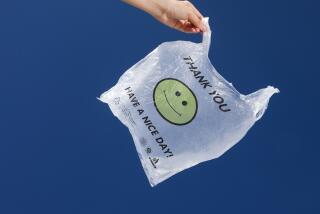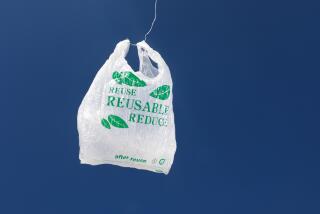Are Bulk Bins Safe?
- Share via
The country store charm of selling foods out of barrels has been one of the more successful devices of the past few years for the supermarket industry. A recent survey found that more than 30% of those chains contacted offered bulk foods, a percentage that grew from virtually nothing in just a few years.
The atmosphere of scoops and bins coupled with potential price savings of up to 50% over packaged products are some of the reasons that consumers have embraced the bulk foods concept. The process is equally attractive to the food retailer whose profit margins on bulk foods are as high as 40%.
Even so, questions persist about the safety and sanitation of this practice of serve-yourself herbs, candies and pastas. The concern was underlined by an article in Progressive Grocer, a supermarket trade magazine, that stated there are a number of supermarket executives who believe that bulk foods are “a disaster waiting to happen.”
The concern is over a possible repeat of the Tylenol poisonings or an unintentional contamination of the bins by sickly customers. Although a number of measures have been taken to reduce the risk of contamination, the potential for a problem remains.
The magazine reported on a survey conducted by UC Davis of 14 northern California supermarkets. About 600 people were observed while shopping among bulk foods. The report found that 20% of those purchasing bulk foods used their hands to place the food items into bags while 15% tasted food directly from the barrels.
Somewhat more surprising is that none of the markets posted a sign in the bulk food section asking shoppers to avoid using their hands.
In a separate, but related matter, the sanitation of bulk foods prompted a letter to The Times on the issue. R. Kelley of Canyon Country wrote: “Attractive as the bulk candies, trail mixes, nuts, etc. may be, people sometime cough right into them. And have you ever noticed how many adults and youngsters rummage around in those foods bare-handed? . . . Food handlers in restaurants . . . are required to wash their hands after every visit to the toilet, but the customers who are allowed to paw through the bulk foods are under no such proscription.”
Lemons Under Wrap--Things are going sour among citrus growers in California and Arizona over whether to obtain government approval for use of a special packaging that would substantially increase the shelf-life of fresh lemons.
The material under review is shrink-wrap that can triple the shelf-life of lemons and decrease the onset of decay, according to California Farmer magazine.
The new packaging has not been adopted because of opposition from Sunkist Growers, the magazine states. Sunkist supports federal control over the marketing of lemons through the Lemon Administrative Committee, which limits the number of fresh lemons that reach retail channels.
Widespread use of shrink-wrap may pressure the committee to increase the number of lemons allowed on the market. The reasoning is that if lemons could last longer, and thus travel farther, then the market for the yellow citrus could be expanded.
The current limits have meant that 500 million lemons rot each year and that only one of three grown is actually permitted to be shipped out of the groves. Additionally, the current practice has driven up lemon prices 30% to 40% and has decreased per capita consumption of fresh lemons by 50% over the past three decades, according to the magazine.
A New Squeeze--Joining shrink-wrap in an effort to increase lemon consumption is a new aerosol product from France. Soon to be available nationally is Cit-Jet Jus De Citron, a foamy lemon concentrate packaged in what looks like a thin can of shaving cream.
The 10 1/2-ounce canister contains the equivalent of 15 lemons. The spray can be used on any food where lemon is appropriate. However, the manufacturers have high hopes for combining Cit-Jet with sparkling waters. Success lies in getting the calorie-conscious crowd to beginning ordering their Perrier with a shot of lemon spray.
Flavoring the Bubbles--Following quickly on the heels of Perrier’s new fruit-flavored mineral waters is Canada Dry. The company is now offering its salt-free seltzer sparkling waters in three flavors: Mandarin orange, lemon-lime and grapefruit.
The word flavor apparently has some negative artificial-ingredient connotations, and both Perrier and Canada Dry promote their new products as including “citrus fruit essence.”
As is true of many products hitting the marketplace, these Canada Dry seltzers with essence are meant to appeal to “upscale men and women.”
More to Read
Inside the business of entertainment
The Wide Shot brings you news, analysis and insights on everything from streaming wars to production — and what it all means for the future.
You may occasionally receive promotional content from the Los Angeles Times.










